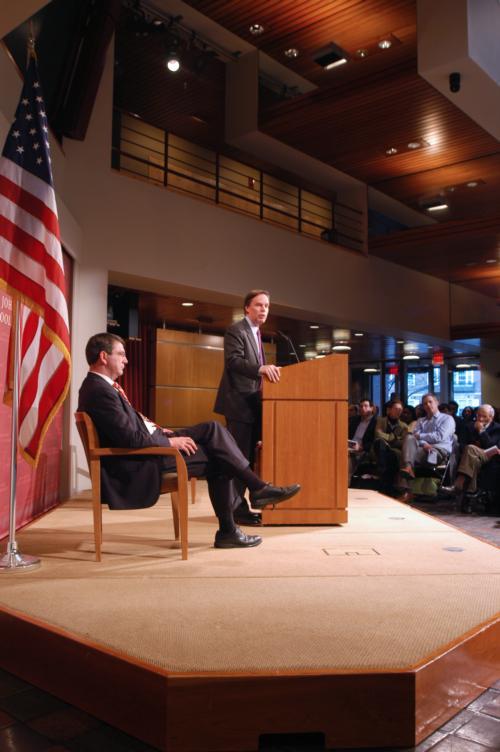
News
Summers Will Not Finish Semester of Teaching as Harvard Investigates Epstein Ties

News
Harvard College Students Report Favoring Divestment from Israel in HUA Survey

News
‘He Should Resign’: Harvard Undergrads Take Hard Line Against Summers Over Epstein Scandal

News
Harvard To Launch New Investigation Into Epstein’s Ties to Summers, Other University Affiliates

News
Harvard Students To Vote on Divestment From Israel in Inaugural HUA Election Survey
Burns Discusses Iran at IOP Forum

Nine days after abandoning his post as Undersecretary of State for Political Affairs, R. Nicholas Burns spoke to a small crowd of students and faculty at the John F. Kennedy, Jr. Forum last night on the next significant challenge to the State Department: Iran.
Burns was introduced by Ashton B. Carter, chair of the international relations department at the Kennedy School and co-author of “Plan B for Iran: What If Nuclear Diplomacy Fails?” Burns, though, highlighted the absolute necessity of fully pursuing a diplomatic solution to conflicts between Iran, Israel, and the rest of the world.
“The Iranians must learn that when they say things, people listen,” Burns said, referring to numerous comments from Iranian President Mahmoud Ahmadinejad calling for Israel’s demise.
Despite his support for diplomacy, Burns was largely pessimistic about the possibility of face-to-face talks, noting numerous times that the United States and Iran have not had meaningful discussions since 1978. “The State Department has not had a diplomat in Iran since 1980,” he said.
The dangers of this silence, Burns said, are very real. While the 2007 National Intelligence Estimate said Iran had halted all nuclear weapons programs, Burns said that media coverage of the estimate had “ignored the second half” of the story. That second half, Burns said, was that researching civil nuclear technologies is a necessary step in developing nuclear weapons.
“The difficulty in developing nuclear weapons is not the weaponing; it is developing the raw materials,” he said.
But despite the danger, Burns said it is still necessary that America and its allies refuse to talk to Iran unless it suspends nuclear production for the duration of the negotiations. “We cannot hold talks while Iran continues to develop nuclear weapons,” he said.
Burns has visited the Kennedy School several times since the mid-1990s, according to Belfer Center Director of Communications and Outreach Sasha Talcott. In September 2006, he hosted a Directors’ Seminar on US policy toward Iran.
Students had mixed reactions to Burns’s performance at the forum, entitled “Clash with Iran: Inevitable or Avoidable?”
Naveed Malik—a Kennedy School student and member of the class “Central Challenges for American Foreign Policy”—asked a two-pronged question about US policy towards Israel and Iran and a potential armed conflict between the two Middle Eastern countries.
“He is a straight-shooter, but he ignored the second part of my question,” Malik said.
The event was hosted by the Kennedy School’s Belfer Center for Science and International Affairs and the Institute of Politics.
Want to keep up with breaking news? Subscribe to our email newsletter.
